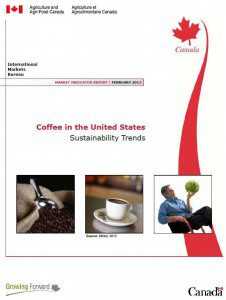Share your coffee stories with us by writing to info@comunicaffe.com.
The Department of Agriculture and Agri-Food of Canada (AAFC) has published a new report titled “Coffee in the United States: Sustainability Trends” that highlights broad trends related to the consumption and market environment of coffee in the United States with a focus on sustainable products.
Executive Summary
Coffee is a household staple in the United States (U.S.), consumed across all incomes, ages, genders and states.
Initially considered a breakfast beverage, it has now been adopted as a drink that can be consumed anytime and almost anywhere. Beyond being a morning habit, coffee is gaining the reputation, particularly among young adults, of being an instant energy boost for those on-the-go.
Consumers are also attracted to the innovations being introduced to coffee products regarding price points, flavours, formats, variety and convenience, seemingly making coffee the perfect option for any occasion.
In a June 2012 survey, Mintel found that 76% of consumers had bought some type of coffee for their household in the past month.
The most popular choice was ground coffee (53%), followed by instant (21%), ready-to-drink (RTD) (20%), single-cup-pods (17%) and whole bean coffee (17%) (Mintel, Coffee in the U.S., 2012).
Within each of these segments, there are options to suit every budget and taste preference, including sustainable offerings, such as certified fair trade, organic, shadegrown, bird-friendly and carbon neutral.
The production of sustainable coffee around the world is growing rapidly, and at a much faster pace than conventional coffee. It is estimated that 16% of the global coffee production and 9% of global coffee sales in 2010 were certified under a sustainability standard (Coffee Barometer, Tropical Commodity Coalition, 2012).
This report highlights broad trends related to the consumption and market environment of coffee in the United States with a focus on sustainable products.
Key findings
- Coffee companies have committed to offering sustainable coffees to their customers by establishing purchasing targets, naming sustainable sourcing in their Corporate Social Responsibility policies and working with standards organizations and growers to ensure a quality supply.
- The entry of multinationals into the sustainable coffee market will increase the level of competition for small coffee roasters, both within the U.S. and exporting into the U.S.
- Initial moves by Multinationals into the sustainable coffee market:
- Nestle: 90,000 tonnes of Nescafé coffee to be certified by Rainforest Alliance by 2020
- Sara Lee: Twenty per cent of their annual coffee volume to be certified sustainable by 2015
- Starbucks: All of their coffee certified sustainable by 2015
- Kraft: All their European coffee brands sustainably sourced by 2015
- Tchibo: Twenty-five per cent of their coffee certified sustainable coffee by 2015
- Coffee falling under the sustainable production umbrella tends to be certified under several standards that rely on self-assessment and external review: Fairtrade International (FLO); Organic (IFOAM); Rainforest Alliance (RA); UTZ Certified (UTZ) and The Common Code for the Coffee Community (4C’s).
- Some companies, such as Starbucks, have also implemented their own private standards for their brands.
- Accurate statistics on the global annual sales of sustainable coffee are difficult to quantify for several reasons: coffee can be certified under more than one standard, yet counted independently in each organization’s total; coffee can be produced as sustainable, but end up being sold through conventional channels; or information from the many small producer groups involved can be totalled inaccurately.
- Generally, there is more sustainable coffee produced annually than is purchased to ensure that there is enough supply to meet specific buyer requirements for quantity, quality, taste and origin attributes.
- There is now growing agreement among stakeholders that greater cooperation is required to meet the needs of the marketplace and the ideals promoted by the standards.
The report can be downloaded at this link.
















